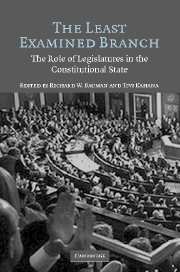Book contents
- Frontmatter
- Contents
- Foreword: Legislatures in the Constitutional State by Amy Gutmann
- Contributors
- New Ways of Looking at Old Institutions
- PART ONE LEGISLATURES AND DEMOCRATIC THEORY
- PART TWO LEGISLATING AND DELIBERATING IN THE DEMOCRATIC LEGISLATURE
- 5 Legislative Judgment and the Enlarged Mentality: Taking Religious Perspectives
- 6 Should We Value Legislative Integrity?
- 7 Nondelegation Principles
- 8 Vox Populi: Populism, the Legislative Process, and the Canadian Constitution
- PART THREE CONSTITUTION MAKING BY LEGISLATURES: THE EXPLICIT VERSION
- PART FOUR CONSTITUTION MAKING BY LEGISLATURES: THE IMPLICIT VERSION
- PART FIVE CONSTITUTIONAL INTERPRETATION AND APPLICATION BY THE LEGISLATURE
- PART SIX IS LEGISLATIVE CONSTITUTIONALISM POSSIBLE?
- PART SEVEN THE LEGISLATURE IN DIALOGUE: DOMESTIC AND INTERNATIONAL CONTEXTS
- Index
6 - Should We Value Legislative Integrity?
Published online by Cambridge University Press: 06 August 2009
- Frontmatter
- Contents
- Foreword: Legislatures in the Constitutional State by Amy Gutmann
- Contributors
- New Ways of Looking at Old Institutions
- PART ONE LEGISLATURES AND DEMOCRATIC THEORY
- PART TWO LEGISLATING AND DELIBERATING IN THE DEMOCRATIC LEGISLATURE
- 5 Legislative Judgment and the Enlarged Mentality: Taking Religious Perspectives
- 6 Should We Value Legislative Integrity?
- 7 Nondelegation Principles
- 8 Vox Populi: Populism, the Legislative Process, and the Canadian Constitution
- PART THREE CONSTITUTION MAKING BY LEGISLATURES: THE EXPLICIT VERSION
- PART FOUR CONSTITUTION MAKING BY LEGISLATURES: THE IMPLICIT VERSION
- PART FIVE CONSTITUTIONAL INTERPRETATION AND APPLICATION BY THE LEGISLATURE
- PART SIX IS LEGISLATIVE CONSTITUTIONALISM POSSIBLE?
- PART SEVEN THE LEGISLATURE IN DIALOGUE: DOMESTIC AND INTERNATIONAL CONTEXTS
- Index
Summary
“We have two principles of political integrity:” – Dworkin suggests in Law's Empire – “a legislative principle, which asks lawmakers to try to make the total set of laws morally coherent, and an adjudicative principle, which instructs that the law be seen as coherent in that way, as far as possible.” In this chapter, I will be concerned with only the first of these two principles. My arguments here aim to show that legislative integrity is not an ideal, certainly not an important one.
THE MEANING OF LEGISLATIVE INTEGRITY
Before we can proceed to the main arguments, a few clarifications about the meaning of legislative integrity are necessary, and some assumptions must be rendered explicit.
Two applications of coherence to the law
Legal theorists have applied the idea of coherence to the law in at least two distinct ways: as part of an explanation of what the law is, and as a value of political morality that the law should strive to adhere to. Dworkin has employed the idea of coherence in both of these ways, but this should not confuse us into thinking that they are the same thing. In the former sense, coherence performs an explanatory function in a theory about the nature of law. In this sense, coherence constitutes part of the conditions for the legal validity of norms: A norm is legally valid if it forms part of, or is entailed by, the most coherent account of other norms that we take to be part of the law.
- Type
- Chapter
- Information
- The Least Examined BranchThe Role of Legislatures in the Constitutional State, pp. 125 - 138Publisher: Cambridge University PressPrint publication year: 2006
- 1
- Cited by



